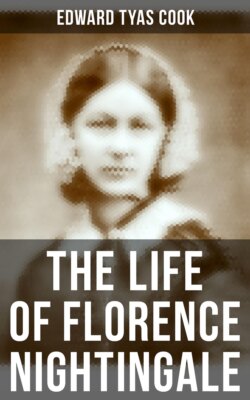Читать книгу The Life of Florence Nightingale - Edward Tyas Cook - Страница 19
На сайте Литреса книга снята с продажи.
V
ОглавлениеFlorence's remark that she would only provide the zéro of esprit to Miss Clarke's quatre, is by no means to be taken literally. She was attractive, and she attracted both men and women. She talked well, and often laid herself out to interest her companions, and sometimes confounded them with learning. In 1844 Julia Ward Howe was in England with her husband, Dr. Howe, and they visited the Nightingales at Embley. “Florence,” writes Mrs. Howe in her reminiscences, “was rather elegant than beautiful; she was tall and graceful of figure, her countenance mobile and expressive, her conversation most interesting.”24 A reminiscence of a later date records an encounter with Sir Henry de la Bèche, the pioneer of the Geological Map of England. Warrenton Smythe and Sir Henry dined at Mr. Nightingale's, and Florence sat between them. “She began by drawing Sir Henry out on geology, and charmed him by the boldness and breadth of her views, which were not common then. She accidentally proceeded into regions of Latin and Greek, and then our geologist had to get out of it. She was fresh from Egypt, and began talking with W. Smythe about the inscriptions, etc., where he thought he could do pretty well; but when she began quoting Lepsius, which she had been studying in the original, he was in the same case as Sir Henry. When the ladies left the room, Sir Henry said to Smythe, ‘A capital young lady that, if she hadn't floored me with her Latin and Greek.’ ”25 “I have been dowagering out with Papa,” wrote Florence to Miss Clarke (March 1843), “in the big coach to a formal dinner-party, where, however, Mr. Gerard Noel and I were very thick, he inquiring tenderly after you and your whereabouts.”
Florence Nightingale as a girl: about 1845
from a drawing by Miss Hilary Bonham Carter
Of Miss Nightingale's personal appearance in early womanhood, there are pen-pictures by very competent hands. Lady Lovelace, in her verses entitled A Portrait, Taken from Life, emphasises a certain spiritual aloofness in her friend:—
I saw her pass, and paused to think!
She moves as one on whom to gaze
With calm and holy thoughts, that link
The soul to God in prayer and praise.
She walks as if on heaven's brink,
Unscathed thro' life's entangled maze.
I heard her soft and silver voice
Take part in songs of harmony,
Well framed to gladden and rejoice;
Whilst her ethereal melody
Still kept my soul in wav'ring choice,
'Twixt smiles and tears of ecstasy. …
I deem her fair—yes, very fair!
Yet some there are who pass her by,
Unmoved by all the graces there.
Her face doth raise no burning sigh,
Nor hath her slender form the glare
Which strikes and rivets every eye.
Her grave, but large and lucid eye,
Unites a boundless depth of feeling
With Truth's own bright transparency,
Her singleness of heart revealing;
But still her spirit's history
From light and curious gaze concealing. …
Mrs. Gaskell's picture in prose gives some lighter touches. “She is tall; very straight and willowy in figure; thick and shortish rich brown hair; very delicate complexion; grey eyes, which are generally pensive and drooping, but when they choose can be the merriest eyes I ever saw; and perfect teeth, making her smile the sweetest I ever saw. Put a long piece of soft net, and tie it round this beautifully shaped head, so as to form a soft white framework for the full oval of her face (for she had the toothache, and so wore this little piece of drapery), and dress her up in black silk, high up to the long, white round throat, and with a black shawl on, and you may get near an idea of her perfect grace and lovely appearance. She is so like a saint.”26 She dressed becomingly; but had a saint's carelessness in such things, somewhat to her elder sister's despair. “Make Flo wear her white silk frock to-night,” she wrote on one occasion to her mother. Many years later, when stores and comforts were being sent out to the East under cover to the Lady-in-Chief, Lady Verney insinuated “one little gown for Flo,” and who will not love her for it? “When in 1849 she started to winter in the East, her mother says”—I quote again from Mrs. Gaskell—“they equipped her en princesse, and when she came back she had little besides the clothes she had on; she had given away her linen, etc., right and left to those who wanted it.”
